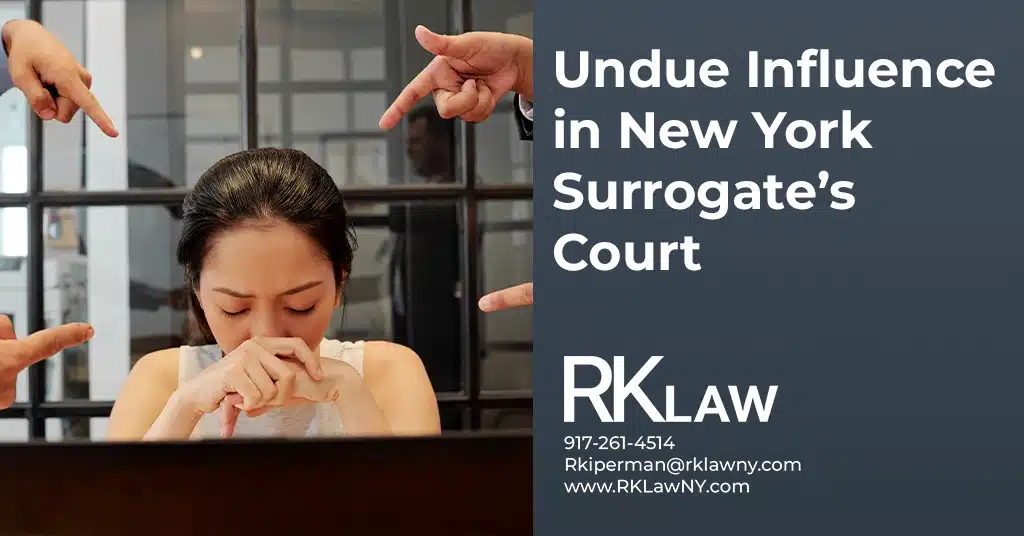In the intricate realm of estate planning and probate proceedings, the New York Surrogate’s Court plays a pivotal role in ensuring that the final wishes of a deceased individual are honored. One of the most critical issues that can arise are claims of “undue influence.”
Undue influence refers to situations in which someone manipulates or exerts pressure on a testator (the person making a will) to gain an unfair advantage in an inheritance or estate dispute.
In this blog post, we will delve into the concept of undue influence within the context of New York’s Surrogate’s Court, exploring its definition, detection, prevention, and providing examples.
Understanding Undue Influence
Undue influence is a concept rooted in the principles of fairness and justice within the probate process. It occurs when a person uses their position of power, trust, or authority to manipulate or persuade the testator into making decisions that do not accurately reflect their true wishes. This coercion can involve various tactics, such as emotional manipulation, isolation from family and friends, or even outright threats.
Examples of Undue Influence in New York Surrogate’s Court:
- The Overbearing Caregiver: An elderly individual may be dependent on a caregiver for daily needs. If that caregiver influences the testator into changing their will to benefit them disproportionately, it raises suspicions of undue influence.
- The Estranged Heir: A family member who has been estranged from the testator for years suddenly becomes the primary beneficiary of a revised will. If there is evidence that this family member pressured the testator into making the change, it can be considered undue influence.
- The Controlling Sibling: In some cases, a dominant sibling may exert control over a more vulnerable testator, manipulating them into modifying their will to the sibling’s advantage.
Detecting Undue Influence
Detecting undue influence can be challenging, as it often takes place behind closed doors and without any tangible evidence. Nevertheless, New York’s Surrogate’s Court employs several strategies to identify and address potential cases:
- Scrutiny of the Testator’s Mental Capacity: At trial, the court will assess the testator’s mental state at the time the will was created or amended. If there are doubts about their capacity, it raises red flags.
- Evaluation of Suspicious Circumstances: At trial, the court will closely examine the circumstances surrounding the creation or amendment of the will, paying particular attention to any signs of coercion, manipulation, or isolation.
- Witness Testimony: Witnesses who were present during the will’s creation may be called upon to testify about the testator’s state of mind and whether they observed any undue influence.
- Documentation and Expert Opinions: Medical records and expert opinions from psychologists or psychiatrists can provide insights into the testator’s mental capacity and susceptibility to undue influence.
Preventing Undue Influence
Preventing undue influence begins with proactive measures taken by both testators and their loved ones:
- Early Estate Planning: Encourage individuals to create their wills and estate plans while they are in good mental and physical health. This minimizes vulnerability to undue influence.
- Transparency: Maintain open lines of communication within the family and ensure that multiple parties are aware of the estate planning process.
- Legal Guidance: Seek legal counsel from experienced estate planning attorneys who can provide guidance, draft documents, and act as neutral third parties.
- Healthcare Proxy and Power of Attorney: Appoint trusted individuals to make healthcare and financial decisions if the testator becomes incapacitated.
Conclusion
The New York Surrogate’s Court plays a vital role in safeguarding the integrity of the probate process. Undue influence is a complex issue that requires careful consideration, and its detection and prevention are crucial for upholding the testator’s true wishes. By remaining vigilant, transparent, and informed, individuals and their families can navigate the estate planning process with confidence, knowing that their final wishes will be respected and protected in the Surrogate’s Court.
For more information, please contact NYC Probate Litigation, Guardianship, NYC Probate and Estate Planning attorney Regina Kiperman:
Phone: 917-261-4514
Fax: 929-556-2089
Email: rkiperman@rklawny.com
Or visit her at:
40 Wall Street
Suite 2508
New York, NY 10005
Visit Regina on LinkedIn
Visit Regina on Facebook
This page is made available by the lawyer for educational purposes only as well as to give you general information and a general understanding of the law, not to provide specific legal advice. By using this site you understand that there is no attorney client relationship between you and the lawyer. The post should not be used as a substitute for competent legal advice from a licensed professional attorney in your state. ATTORNEY ADVERTISING.
